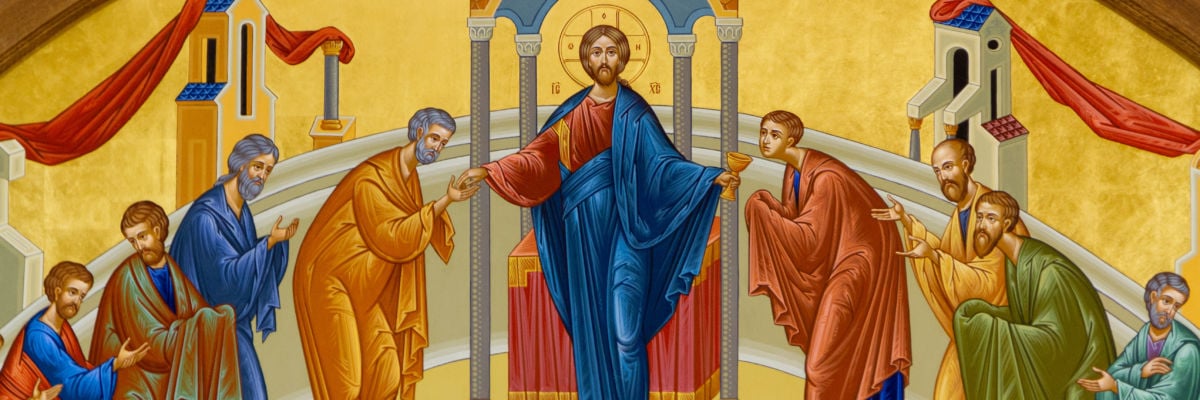
In part one of this series, we refuted the common claim that Catholics are cannibals because of our belief in the Real Presence of Christ in the Eucharist. Now, we are going to change gears a bit and respond to an even more common objection.
When I debated Dr. Peter Barnes in Australia back in 2011, he claimed that Jesus’ words in John 6:53—“unless you eat the flesh of the son of man and drink his blood, you have no life in you”—were never intended to be taken literally. Our Lord, Dr. Barnes claimed, was obviously using purely symbolic language. After all, didn’t Jesus say he was a “door” in John 10:9? Didn’t he say he was a “vine” in John 15:5?
How do we respond?
We can begin by noting that if Jesus meant to speak purely symbolically in John 6, his competence as a teacher would have to be called into question. Think about it: In the cases of Jesus saying he was a “door” in John 10 or a “vine” in John 15, no one asked, “How can this man be a door made out of wood?” or, “How can this man claim to be a plant?” When Jesus spoke in metaphor, his audience understood it as such. But in John 6, the audience was clearly shocked by the claim, and many left him. If Jesus felt he was misunderstood, he would have said so.
Moreover, when we examine the surrounding context of John 6:53, Jesus’ words could hardly have been clearer. In verse 51, he plainly claims to be “the living bread” that his followers must eat. And he says in no uncertain terms that “the bread which I shall give… is my flesh.” We Catholics don’t have a problem with the definition of the term “is,” although some politicians have been known to confuse its meaning.
At any rate, then, when the Jews were found arguing “among themselves, saying, ‘How can this man give us his flesh to eat?’” in verse 52, far from clearing up any misunderstanding here, Jesus reiterates his point even more emphatically, “Truly, truly, I say unto you, unless you eat the flesh of the Son of man and drink his blood, you have no life in you.”
Compare this with other examples in Scripture when followers of the Lord are confused about his use of metaphor. In John 4:32, for example, Jesus said: “I have food to eat of which you do not know.” The disciples thought Jesus was speaking about physical food and thought he was angry at them for failing to bring food. Our Lord quickly clears up the point using concise, unmistakable language in verse 34: “My food is to do the will of him who sent me, and to accomplish his work.”
In Matt. 16:5-12, we find something similar:
When the disciples reached the other side, they had forgotten to bring any bread. Jesus said to them, “Take heed and beware of the leaven of the Pharisees and Sad’ducees.” And they discussed it among themselves, saying, “It’s because we brought no bread.” But Jesus, aware of this, said, “O men of little faith, why do you discuss among yourselves the fact that you have no bread? Do you not yet perceive? Do you not remember the five loaves of the five thousand, and how many baskets you gathered? Or the seven loaves of the four thousand, and how many baskets you gathered? How is it that you fail to perceive that I did not speak about bread? Beware of the leaven of the Pharisees and Sad’ducees.” Then they understood that he did not tell them to beware of the leaven of bread, but of the teaching of the Pharisees and Sad’ducees.
These considerations alone would suffice for our purposes, but when we also consider the language used by St. John in John 6, a more literal interpretation becomes even more obvious. For example, when Jesus speaks of eating his flesh in John 6:50-53, St. John uses various forms of the Greek verb phago for “eating” when he recounts Jesus’ words. However, after the Jews begin to express incredulity at the idea of eating Christ’s flesh, his language actually intensifies. In verse 54, St. John begins to use trogo, a decidedly more graphic term that literally means “to chew on” or to “gnaw on,” as when an animal is ripping apart its prey. This is just the opposite of what you would expect if Jesus was speaking symbolically.
Further, in verse 61, it is no longer just the Jewish multitudes, but the apostles themselves who are having difficulty with Our Lord’s radical statements. Surely, if he were speaking purely symbolically, he would clear up the difficulty now among his apostles. But what does he do? He reiterates the fact that he meant just what he said: “Do you take offense at this? Then what if you were to see the Son of man ascending where he was before?” Would anyone think him to have meant, “What if you were to see me symbolically ascend?” Hardly! The apostles would, in fact, see Jesus literally ascend to heaven in Acts 1:9-10.
Finally, our Lord turns to the twelve. What he does not say to them is perhaps more important than what he does say. He doesn’t say, “Hey guys, I was misleading the Jewish multitudes, the disciples and everyone else, but now I am going to tell you alone the simple truth that I was speaking purely symbolically.” Instead, he says to them, “Will you also go away? (v.67)”
This is not language intended to console and dilute his clear literal intent. Remember, thousands among these people were followers of the Lord who had professed their faith in him. Many of these are clearly referred to as “disciples” or those that believed. If Jesus’ words were purely symbolic, meaning “you have to give everything and follow me,” these people were already doing that! Would he let them leave over a misunderstanding?
This text is straightforward—it challenges all who will ever read it, just as our Lord challenged the multitudes who heard his words two millennia ago, and just as Jesus challenged the apostles themselves. This most profound question from our Lord echoes down through the centuries calling all followers of Christ in a similar fashion. With St. Peter, those who hear the voice of the Shepherd respond: “Lord, to whom shall we go? You have the words of eternal life. (v.68)”



